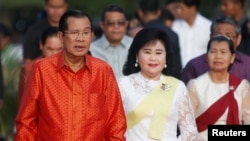A company connected to a bloody March 8 crackdown in Cambodia when security forces shot protesters after burning homes to the ground is headed by nieces of Prime Minister Hun Sen’s wife, Bun Rany, according to Cambodian government records.
A security force comprised of 150 police, soldiers and military police opened fire on hundreds of protesters who had blocked a road in Kratie province - enraged that houses had been torched and community members were arrested during a forced eviction earlier that day from a rubber plantation.
At least three people were shot at Memot Rubber Plantation’s concession in Pi Thnou commune, while others claim to have been beaten.
Senior provincial court, government and police officials directed the operation, according to a National Police letter obtained by VOA.
Kim Sokleap and Kim Chamroeun, who are listed as directors of Memot Rubber Plantation under both the previous and current Ministry of Commerce company registration databases, are both daughters of Bun Rany’s sister, Bun Samlen.
A Memot Rubber Company representative, who refused to give her name, declined to answer specific questions about the firm’s directors.
“What I can tell you is that the current general director’s name is not the name that you raised [Kim Sokleap]. I can give you only that information,” she said, declining to elaborate and directing a reporter to a statement released by the company on March 11.
The statement sheds no light on the company’s ownership and did not address the use of violence to quell the protest.
It did say Memot Rubber Plantation had cut 3,000 hectares of land from the concession, which it said was awarded in 2008, to appease the claimants.
“The company has never violated or affected people’s land. On the contrary, [the company] has been affected by an anarchical group who are cultivating forests for land subsequently,” the statement said.
Global Witness campaigner Emma Burnett said this use of violence by powerful elites to settle a land dispute was far from an isolated case in Cambodia.
“Successive Global Witness investigations have shown how high-ranking politicians, their relatives and friends in business have used state security forces and violent tactics like murder, arson and shootings to seize forests and land, and to deal with those that have dared to stand in their way,” she said.
Eight villagers were arrested on charges of criminal incitement, destruction of property, intentional acts of violence and blocking a road. They have since been freed on bail.
No one has been arrested for firing at the protesters.
A proportionate use of force?
Authorities have completely blocked access to the site of the clash on National Road 76 at the perimeter of Memot Rubber Plantation’s 9,855 hectare concession in Snuol district.
Wrapping up her latest visit to Cambodia, U.N. Special Rapporteur Rhona Smith condemned the lockdown and the burning of villagers houses on Wednesday.
“In the interests of promoting trust and transparency, I believe it is important to allow independent monitors access. I call for an independent investigation,” Smith said in her official report of the trip.
VOA reporters were able to visit villagers involved in the clash and staying nearby, including two who said they were beaten by security forces before being arrested and charged.
The villagers admit their claims to the land are weak.
Those interviewed by VOA said they arrived about three years ago - after the concession was awarded -looking for any kind of economic opportunity, having found farming untenable at their prior residences in Kampong Cham and Tboung Khmum provinces because of chronic flooding.
After settling on land that appeared to be unused, they said they had been largely left alone to tend theses fields, until March 8. A day before the clash authorities began burning buildings erected by migrants throughout the concession.
When word spread authorities were burning people’s houses and had arrested two who had tried to resist, tempers flared and the villagers decided to block National Road 76.
What triggered gunfire about one hour later is unclear, but several witnesses recalled seeing men in all black uniforms firing, suggesting provincial military police.
Initial claims that as many as eight people had been killed were incorrect.
Veum Duy, 64, who was arrested and released on bail, said he was the first to be attacked, sustaining injuries on his neck, hip and leg.
“They surrounded [us] and kicked with their legs and punched us,” Duy said while sitting in a house with other villagers.
A security force member, who spoke on the condition of anonymity, told VOA a fire truck with a water cannon that had been called in to help break up the protest was moments away from arriving when gunfire broke out. Showing video from behind police lines of houses being burned, the source lamented the brutality of this action and the arrests.
Deputy Provincial Governor Hoeur Siyem, Provincial Police Chief Lon Sophat and Deputy Provincial Prosecutor Chea Sopheak declined to speak with VOA.
However a letter dated on March 8, from Lon Sophat to General Neth Savoeun, the National Police Chief of Cambodia, confirms that Hoeur Siyem, Chea Sopheak and district governor Kong Kimny led the operation.
An earlier version of this story misdated the protest in the Kratie Province.







